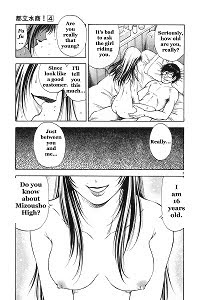All right, I'll actually put a little something up. Here's the work I did on the first three pages of Lesson 38. I know, I know, I should have started on Lesson 35, but, honestly, I opened the wrong folder and before I knew it I'd started working on it and I just had to finish it as best I could for some reason. What could it have been?
Lesson 38
片っぱしから!
Katapposhikara!
片っ端から 【かたっぱしから】 (adv) absolutely every little bit; everything from A to Z
So of course I translated it:
Why? It's an old Japanese proverb, basically saying the same thing as "When it rains, it pours." Just when Tanabe doesn't think his life could get worse, it does, big-time.
Page 1
Box Text: 歌舞伎町・某ヘルス店内――
Kabukichou - bou herusu tennai――
Kabukicho - A certain sex club――
Customer: あぁう…
某 【それがし】 (pn,adj-no) (1) (obs) someone; (2) I;
personal pronoun
何某; 某 【なにがし; なにぼう(何某)】 (pn,adj-no) (1) certain person; certain amount; Mr So-and-so; (2) I (personal pronoun)
ヘルス (n) (1) health; (2) type of massage parlor (parlour); (P); EP
店内 【てんない】 (n,adj-no) store interior
Panel 2
Customer: 若いのにすごいテク持ってね~~
Wakai no ni sugoi teku matte ne~~
Amazing technique for one so young.
若い 【わかい】 (adj-i) young
すごい (adj) terrible; dreadful; terrific; amazing; great; wonderful; to a great extent; ; KD
テク (n) (1) (abbr) technology; (2) (sl) technique; (P); EP
Possible inflected verb or adjective: (te-form)
持つ 【もつ】 (v5t) (1) to hold; to carry; (2) to possess; (P); EP
SFX: チュッ・チュッ・チュッ・チュッ・ズズッ・パッ・バッ
Chuu! Chuu! Chuu! Chuu! Chuu! Zuzu! Pa! Ba!
Chu is the Japanese onomatopoeia for a loud kiss, so chuu! suggests a longer, louder version of the sound. A good-old-100%-American dirty comic like Cherry Poptart might render the sound effects here as Shlorp! Shlorp! Shlorp! Shlorp! Shlorp! Suuu(pop!bop!)--the last being the sound as the fellator sucks on the tip and pops it out of her lips for a moment and a breath or two. Here, decades of field research definitely does count in my favor!
Fuzoku Girl: ふぉうお。(ふりがな:どーも)
Fuo ou (The furigana spell out "Doumou" which means that the girl wanted to say that but it came out another way because her mouth is full.)
Panel 3
ねェ、本番やらしてよ。お金なら私うしさ。
Nee, honban yasashite yo. O-kane nara watashi ushisa. Neh, for the real thing. How much money would I need? [It is not clear who is speaking. Watashi usually means a woman is speaking, but males can use it too, especially when trying to be polite and/or formal. So it might also be the Fuzoku girl saying something like "Now, about the real thing--I will need more money."
Fuzoku girl: ダメです~~罰金100万円ですよ~~
Dame desu~~(other stuff)
Lit. "The penalty will be...one million yen...
本番 【ほんばん】 (n) (1) performance; take; going before an audience or on-air; (2) game; season; crucial moment; (3) actual sexual intercourse (i.e. not simulated)
チェッ。CHEH!!
One million yen: This is a joke. A really top-line courtesan might get this for an evening's services (around $8-10,000) but someone working in a Kabukicho costume-play club would charge no more than a few 10,000 yen bills.
Incidentally, Japanese (and Chinese, Koreans, etc) don't have their own word for "million" because their traditional number system has an extra step: 10,000's. Except for scientists and engineers who use a lot of Western-style math, this is how the "man in the street" thinks of numbers. Given the English "million" which just about everyone will know, they will internally translate it to "One-hundred-ten-thousands." instead of "One thousand thousands" the way people raised using the Western system do.
Panel 4
SFX: ギシッ
Handwritten text under the panel: 騎乗位_股
騎乗 【きじょう】 (n,adj-no) mount; on horseback
騎 3533 [2119:8b52] U9a0e B187 G8 S18 F1696 J1 N5222 V6761 H1834 DK1193 L1981 K1734 O2762 DO1174 MN44817 MP12.0530 E1133 IN1881 DF1911 DJ1874 DG1919 DM2000 P1-10-8 I10a8.3 Q7432.1 DR3449 Yqi2 Yji4 Wgi キ equestrian; riding on horses; counter for equestrians [Short entry for this kanji at JDIC. The "GI" means that this really complicated kanji isn't taught until the eighth grade in Japan. It's made up of the kanji 馬 for "horse" on the left, 大 ("big") on the top right, and 可 meaning "can" or "shouldn't or a number of other things on the lower right. I had no end of trouble re-discovering this one because I thought the 大 was a badly-drawn 立]
Babel renders part of this as "cowgirl." I just cannot make out one of the kanji and haven't found any compound that fits with the others.
Page 3
Panel 1
Customer: しかし実際のトコいくつなの?
How much, really?
How much, really?
Fuzoku Girl: ちょっとォ、女の子にトシ聞くのって反則ですよ~~
Chotto, onna no ko ni toshi
It's bad to ask when the girl is riding you.
SFX: ギシッ・ギシッ Gishi! Gishi!
Panel 2
Customer: いいじゃない、本当に若いんだろ?
Ii ja nai. Hontou ni wakai n'daro?
Whatever. But how old are you, really?
Fuzoku Girl: …フフっ (laughing)
Panel 3
Fuzoku Girl: 言っちゃおっかな~~
Iccha okka na~~
Let's say that...
Fuzoku Girl: お客さんロカタそうだし。
O-kyaku-san rokata sou dashi.
お客さん O-kyaku-san Honorable Customer
ロカタ ろかた 路肩 (n) shoulder of a road; berm
そうだし soudashi (probably sou da shi or sou dashi)
I really can't make this out at all.
Babel Fish gives: "The customer shoulder so it puts out,"
and Google translation renders it "They seem to be the customers shoulder"
If ROKATA is Japlish, it might mean, "The Honorable Customer is now LOCATED at the edge of the road" which in turn might mean "You're close to ejaculating" or "Where we go on from here depends on (money)" or both.
Or: "Since we've come this far..."
Panel 4
:実なね、Jitsu na ne Actually; Really
:ここだけの話――
Koko dake no hanashi――
Google: Ourselves
Babelfish: Here sufficient story
My guess: "Just between ourselves--"
Panel 5
Fuzoku Girl: 私、16歳なの。
Watashi 16 sai na no.
I am 16 years old.
Fuzoku Girl: 都立水商って知ってる
Toritsu Mizushou 'tte shitteru?
Do you know about Mizusho High?
Page 3
(Scene changes to daytime, at Mizusho High)



